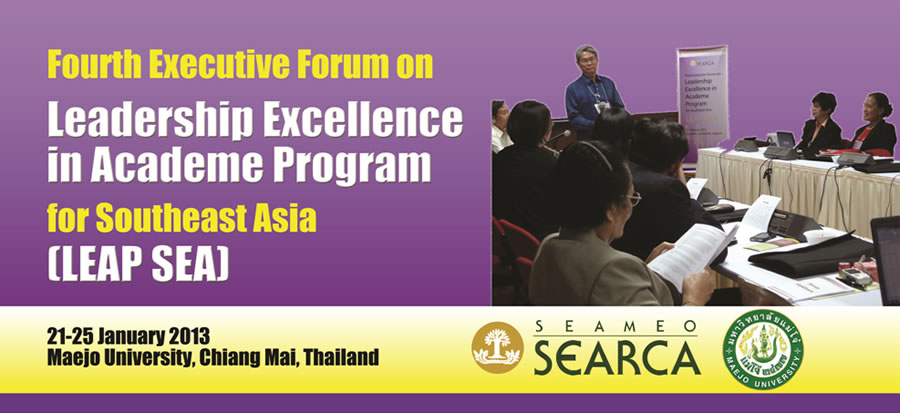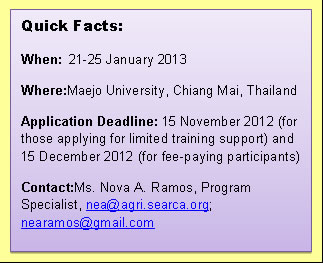
A program for higher education administrators in agriculture
Program Background and Rationale
 The Leadership Excellence in Academe Program for Southeast Asia (LEAP SEA) is the enhanced version of SEARCA’s Advanced Higher Education Administrator Development Course (AHEAD), which ran from 1993 to 2003. AHEAD had almost a thousand executives and potential executives of higher education institutions as training alumni. AHEAD was undertaken so that Southeast Asian higher education administrators would not lag behind their counterpart institutions in other areas of the world.
The Leadership Excellence in Academe Program for Southeast Asia (LEAP SEA) is the enhanced version of SEARCA’s Advanced Higher Education Administrator Development Course (AHEAD), which ran from 1993 to 2003. AHEAD had almost a thousand executives and potential executives of higher education institutions as training alumni. AHEAD was undertaken so that Southeast Asian higher education administrators would not lag behind their counterpart institutions in other areas of the world.
SEARCA piloted LEAP SEA in May 2009 in cooperation with the Asian Institute of Management (AIM), SEAMEO Regional Center for Higher Education (RIHED), University of Asia and the Pacific (UA&P), Asian Association of Agriculture Colleges and Universities (AAACU), and SEAMEO Secretariat. The second offering of the LEAP SEA executive forum took place in Bogor, Indonesia in July 2010, with the Southeast Asian Regional Center for Tropical Biology (BIOTROP) as co-organizer and host. Its third run took place in March 2012 at SEARCA.
Fourteen higher education administrators from five Southeast Asian countries participated in the LEAP SEA pilot executive forum; 22 from seven countries participated in the second offering; and 17 from seven countries participated in the third offering. The fourth LEAP SEA offering will also be a regional forum. It will accommodate up to 25 participants from SEAMEO member countries.
LEAP SEA recognizes that the greater proportion of executives of higher education institutions in the region, having had ample experience in academic administration, actually just need updated information about the management of higher education in agriculture. On the other hand, academic administrations periodically take a change in hands, as younger faculty members gain experience and academic credentials and are appointed to such executive positions. Also, the amount of new information that academic administrators, particularly of colleges and universities, may need to know increases rapidly over time.
Program Objectives
The program aims to:
-
Provide a learning forum where significant new knowledge about leadership in and management of higher education, especially those in agriculture, may flow between experts and senior or mid-level executives of higher education institutions in the SEAMEO member countries.
-
Provide an opportunity for academic executives to reflect on their common contemporary challenges and suggest appropriate solutions in higher education leadership/management in Southeast Asia.
-
Invite writing of LEAP SEA cases as knowledge and learning resources appropriate for Southeast Asia.
Program Description
The major learning event of the program is a five-day face-to-face executive seminar-workshop where participants will discuss advances in higher education leadership in the context of contemporary challenges they face and appropriate solutions tried. In this seminar-workshop, they will identify and prioritize cross-cutting issues that they are addressing and will address in the next few years. The seminar-workshop also includes a review of management principles and will guide participants to applying these in higher education in agriculture and forestry.
After this, SEARCA would invite selected participants t write and share two-to-four page case stories that may be packaged and shared as single-sheet digital resource and in time compiled into a case monograph.
Expected Outputs
-
A cadre and network of highly competent academic leaders in Southeast Asia;
-
Case stories highlighting reflections and replicable practices on academic leadership in tertiary and postgraduate academic institutions in agriculture, forestry, and environmental studies in the context of Southeast Asian realities and challenges; and
-
List of potential synergies among such institutions.
Program Content
The Fourth LEAP SEA Executive Forum will cover the following modules:
Module 1: The Environment of Higher Education Institutions in Agriculture in Southeast Asia (Analysis of External Factors –challenges of the 21st century impinging on higher education institutions, and development and practices across the globe, with focus on what is relevant for Southeast Asia.
Module 2: Challenges, Issues, and Opportunities: Strategic Positioning of HEIs in Agriculture and Southeast Asia (Analysis of Issues Internal to Higher Education Circles) –principles and process of strategic planning and management, pointing out the importance for each HEI to be clear on its niche or strategic positioning.
Module 3: Managing Instruction – issues and principles in managing academic programs in agriculture with innovative curricula/content, delivery approaches, organization and administration, and overall design that are highly responsive to 21st century realities of Southeast Asian HEIs.
Module 4: Managing Research and Extension –concepts and principles of managing research and extension, cognizant of the challenges faced by HEI executives in agriculture in Southeast Asia, with model cases or practices.
Module 5: Managing Change and Conflict in HEIs in Agriculture –change management concepts and principles, with specific cases.
Module 6: Generating and Managing Resources in HEIs in Agriculture – exceptional case on resource generation and management in higher education in agriculture.
Module 7: Academic Leadership Principles and Practices – managerial leadership principles and practices appropriate in an academic context.
Executive Forum Duration and Venue
21-25 January 2013 (5 days) | Maejo University, Chiang Mai, Thailand
Executive Forum Fee
- The forum fee is US$694 per participant, which covers forum materials, meals during the duration of the forum, accommodation (twin-sharing), and airport transfers. Live-out rate is US$403.00. Subsidized rates are available upon request.
- All other expenses associate with the forum (international air travel, visa, airport terminal fees, local insurance, and other personal expenses) are at the participants’ own expense.
NOTE: Limited training support is open only to qualified nationals of SEAMEO member countries (i.e., Cambodia, Indonesia, Lao PDR, Myanmar, Philippines, Thailand, Timor Leste, and Vietnam).
Applications
The deadline for application with limited training support is 15 November 2012. Deadline for registration of all other applicants is 15 December 2012.
For the application form for fee-paying participants, please [rokdownload menuitem="119" downloaditem="623" direct_download="true"]click here[/rokdownload].
For training grant applicants, please click on the [rokdownload menuitem="119" downloaditem="624" direct_download="true"]application form[/rokdownload] and [rokdownload menuitem="119" downloaditem="622" direct_download="true"]nomination form[/rokdownload].
Additional Information
[rokdownload menuitem="119" downloaditem="625" direct_download="true"]Program Brochure[/rokdownload]
Program Schedule
Travel Information